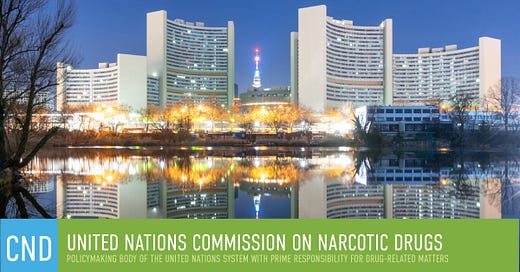A Good Sign for Schedule III
In Vienna, U.S. champions member-state discretion over domestic drug policy under Single Convention
Together and separately, Matt and I have warned that U.S. obligations under a United Nations treaty called the Single Convention on Narcotic Drugs of 1961 are one of the only remaining obstacles to moving cannabis to schedule III and taking the cannabis industry out of 26 U.S.C. 280E’s ambit. As we’ve explained, no matter how many people tell you that schedule III is a “done deal” and that 280E relief will be here before the next election, the reality is we have a long way to go. We don’t even have DEA’s proposed rule yet, and even if we did have it and knew that it proposed moving all cannabis to schedule III, these declarations of victory would still be premature. After all, the proposed rule is far from the end of the process. We would still have to navigate notice and comment, ALJ hearings, the final rule, and judicial review before any of this is a done deal. You know what they say about counting chickens when all you’ve got is eggs:
That said, a small but arguably significant development occurred last week, though it went almost completely unnoticed in the cannasphere. That’s probably because it occurred in Vienna, and to know about it, you had to tune in to a four-plus hour broadcast of “UN Web TV.” Had you done so, however, you would have caught Patt Prugh’s live comments on the topic of “Non-Compliance of Responses with International Drug Control Conventions & Human Rights Obligations” before the U.N.’s Commission on Narcotic Drugs (CND).
The CND is the U.N.’s official policymaking body for all drug-related matters, and Patt Prugh, a senior Legal Advisor for the U.S. Department of State, is the “primary legal counsel providing advice and guidance to the Bureau of International Narcotics and Law Enforcement Affairs, the office of the State Department responsible for representing the United States at the Commission on Narcotic Drugs (CND) and other anti-crime fora in Vienna.” In other words, when it comes to U.S. obligations under the Single Convention (and a whole bunch of other stuff), Patt Prugh is an absolute boss. And last Wednesday, she spoke on behalf of the U.S. to address the topic of member state non-compliance with the Single Convention’s terms (think cannabis legalization (particularly adult use) in countries around the world).
As background, for years now, the International Narcotics Control Board (INCB), an independent body that describes itself as “the independent and quasi-judicial monitoring body for the implementation of the United Nations international drug control conventions,” has repeatedly chastised the U.S. for failing to comply with its treaty obligations by permitting and tolerating state-level legalization and use of medical cannabis. And when Patt Prugh took the microphone to address the CND in Vienna, INCB leadership were in the audience listening.
You can hear her comments in full here beginning at 2:16:43, so I’ll just summarize a few of them here. First, she emphasized the flexibility of the treaties, and their “highly respectful” disposition toward “the legal frameworks of states parties, in particular their constitutional limitations.” Second, she insisted that contrary to its own self-descriptions, the INCB’s proper role under the Single Convention is to “assist” member states, not “monitor” their compliance. Third, she argued that the Single Convention should be interpreted “in good faith” to accomplish its purpose, which, in her view, is decidedly internationally as opposed to domestically oriented. As she put it, the treaty is focused on drug trafficking that has “an international dimension.”
These comments struck me as bold and a bit surprising coming from the U.S. They seem to reject outright the INCB’s claims to “quasi-judicial” authority to monitor member state treaty compliance—particularly when it comes to those countries’ domestic policies. And the claim that the treaty’s focus is limited to drug-related issues “having an international dimension,” seems to underscore the point that member states’ domestic approaches to controlled substances are their own business.
While I’m no expert in the history of U.S. interpretation and implementation of the Single Convention, I have studied the subject enough to know that we haven’t always viewed the Single Convention as agnostic to member states’ domestic laws. I’ve explained previously, for example, that when Harry Anslinger appeared before the U.S. Senate in 1967 to urge U.S. accession to the Single Convention, he sold it as a measure designed and intended to constrain U.S. domestic policy—namely the “disturbing” specter of state-level cannabis legalization. “Several groups in the United States [were] loudly agitating … to legalize [marijuana] use,” Anslinger warned. And because the Congress couldn’t (under prevailing precedent at the time at least) ban use and possession of cannabis outright at the federal level under the Interstate Commerce Clause, Anslinger urged the Senators to use “treaty obligations to resist” their efforts:
Another important reason for becoming a party to the 1961 convention is the marihuana problem .... Several groups in the United States are loudly agitating to liberalize controls and, in fact, to legalize its use .... If the United States becomes a party to the 1961 convention we will be able to use our treaty obligations to resist legalized use of marihuana. This discussion is going on all over the country, in many universities, and in fringe groups, and it is rather disturbing.
Of course, as legal scholars have recognized since, the Constitution doesn’t permit the President to increase Congress’s lawmaking power by entering into a treaty. Nevertheless, Anslinger succeeded in convincing the U.S. to accede to the Single Convention, and we’ve been in this “treaty trap” ever since. Very much aware of this issue and the potential obstacle it could pose to sensible cannabis reform, Matt and I wrote a law review article arguing that this arrangement is unconstitutional.
Notice, however, that Patt Prugh’s comments arguably sketch a different vision of the scope, purpose, and limits of the Single Convention and U.S. obligations under it. Her emphasis on the international focus of the treaty seems to reject Anslinger’s view of the treaty as a tool for overriding member state’s domestic policies (in the case of the U.S., state-level efforts to legalize cannabis). The same goes for her emphasis on the treaty’s “highly respectful” disposition toward “the legal frameworks of states parties, in particular their constitutional limitations.”
In short, as I listened to Patt Prugh’s comments, I couldn’t help but wonder whether she was laying the groundwork for a U.S. approach to the Single Convention designed not thwart state-level cannabis legalization efforts but to accommodate them.
Of course, everything I’ve said here should be taken with a massive grain of salt. I’m reading a whole lot into a very short statement from a single State Department official, and she didn’t mention—much less defend—the ongoing administrative process to reconsider cannabis’s schedule I status under U.S. federal law. That said, given their substance and timing, I do think Patt Prugh’s comments should be viewed as a positive sign for schedule III’s supporters.






So if the USG is taking the position that our domestic drug policy doesn't affect international commerce, can we overturn Wickard v. Filburn based on the same logic as between the States?
Excellent, thanks for sharing…
I like her comments at ~2.21.45 where she says “ Vital importance of enhancing access to treatment including medication assisted treatment……assuring access to control medications for medical and scientific purposes.”
Lane